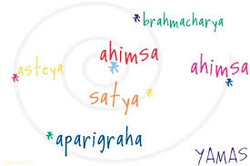 In the Yoga Sutras, Patanjali breaks down the theory of yoga into eight steps or limbs. He refers to these as astanga, not to be confused with the branch of yoga with the same name; asta in sanskrit means eight. The eight limbs to yoga are not meant to be followed in order; you do not have to accomplish step one before moving on to step two. Instead, they are meant to be practiced together. The eight steps are: yamas (your moral codes towards other people), niyamas (your moral codes towards yourself), asana (poses), pranayama (regulation of the breath), pratyahara (withdrawal of the senses), dharana (concenttration), dyhana (meditation) and samadhi (bliss). “The five points of yama, together with the five points of niyama, remind us of the Ten Commandments of the Christian and Jewish faiths, as well as of the ten virtues of Buddhism. In fact, there is no religion without these moral or ethical codes. All spiritual life should be based on these things. They are the foundation stones without which we can never build anything lasting. ” ― Swami Satchidananda, The Yoga Sutras This is such a great quote because it explains that these codes or rules are for everyone; yoga is not a religion so it does not conflict with religions but is based on similar codes that all can share. The yamas break down into five branches of their own. They are as follows: 1. Ahimsa The word ahimsa means non-violence. I use it all the time in yoga classes to remind students not to push their bodies into pain or beyond its limits that day. But the definition goes way beyond the yoga mat. Ahimsa means non-violence to every living thing. If you are unkind to someone, you would not be practicing ahimsa. Offering no judgment on my part as I am not a vegetarian, ahimsa is also not being followed when we choose to eat meat or animal proteins. Killing the bothersome fly in your kitchen is himsa, violence. Ahimsa is kindness and thoughtfulness before acting or thinking about others. It means in all situations to do no harm. 2. Satya Satya means truth. Satya tests us to look for the truth in everything. On the mat, the truth might be today I cannot do any back bending because of low back pain. If I follow ahimsa on the mat, I will find a different pose to do while the rest of the class enjoys their back bending! If, instead, my ego pops in to tell me I will look stupid or not as good if I don't do the backbend and I choose to listen, I am not practicing ahimsa nor am I listening to the truth. Satya and ahimsa must not conflict with each other. If I know a truth but it will hurt someone should I express it to them , I must keep it to myself or fail to follow ahimsa practices. This means sometimes white lies are considered good. Remember the expression, "If you have nothing nice to say, don't say anything at all"? According to the yamas, you should heed this. Telling lies is the obvious opposite of satya, speaking the truth. But, so is lying to or about yourself. Bragging and exaggerating are forms of untruths. Talking yourself out of blame for your actions is also a non-truth. Telling someone to do something one way and then doing it another is hypocritical and it is also a non-truth. 3. Asteya Steya means to steal. Asteya is the opposite; not taking something that does not belong to us. It also means not using other people's things beyond the set intention. For example, let's say I borrow a hose from my neighbor to water my garden and I promise I will return it that day. But then I hang onto it overnight and use it the next day to wash my car. I have fallen to steya in two different ways in this one example; I "stole" time keeping the hose longr than promised and I "stole" it for a purpose not offered to me. What about when you call a friend to vent? If you are imposing upon them, steya here menas you are stealing away their time and energy. 4. Brahmacharya Brahmacharya means self control and usually refers to abstinence from sexual activity. Does this mean in order to follow the eight limbs of yoga that you have to become celibate? What if you are in a committed relationship, let's say even married, and Person A declares celibacy while Person B does not. Person A is actually inflicting himsa, violence, on the other. You could even say Person A is also inflicting steya, stealing away the other's rights to sexual activity. So, instead, consider that brachmacharya refers to your control while engaging in sexual relations. Are you practicing ahimsa? Are you respectful of the person you are with as well as of yourself? Are you present or are you thinking about unanswered email? Your sexual energy needs to be in line with all aspects of the yamas. 5. Aparigraha Aparigraha means non-hoarding. Do you continually buy more than you need? Do you recycle or donate what you choose to let go of to the benefit of others and Earth? Consider aparigraha as thoughts, too, not just tangible stuff. Even yogis can fall victim to hoarding thoughts such as 'I want more enlightenment, I want more peace, I want...'. Aparigraha is about being present and accepting that what you have is enough. Judith Lasater writes, "In the second chapter of the Yoga Sutras, Patanjali states significantly in verse 16 that “the sorrow which is yet to come is to be discarded.” This future sorrow is avoided because of the choices one makes now, thus creating a future in which suffering is lessened. It is critical to remember that the teachings of the Yoga Sutras are not presented in an attempt to control behavior based on moral imperatives. The Sutras do not state or imply that one is “bad” or “good” based upon one’s behavior. Rather, Patanjali teaches that if one chooses certain behavior one gets certain results."
0 Comments
Leave a Reply. |
Archives
March 2024
|

 RSS Feed
RSS Feed